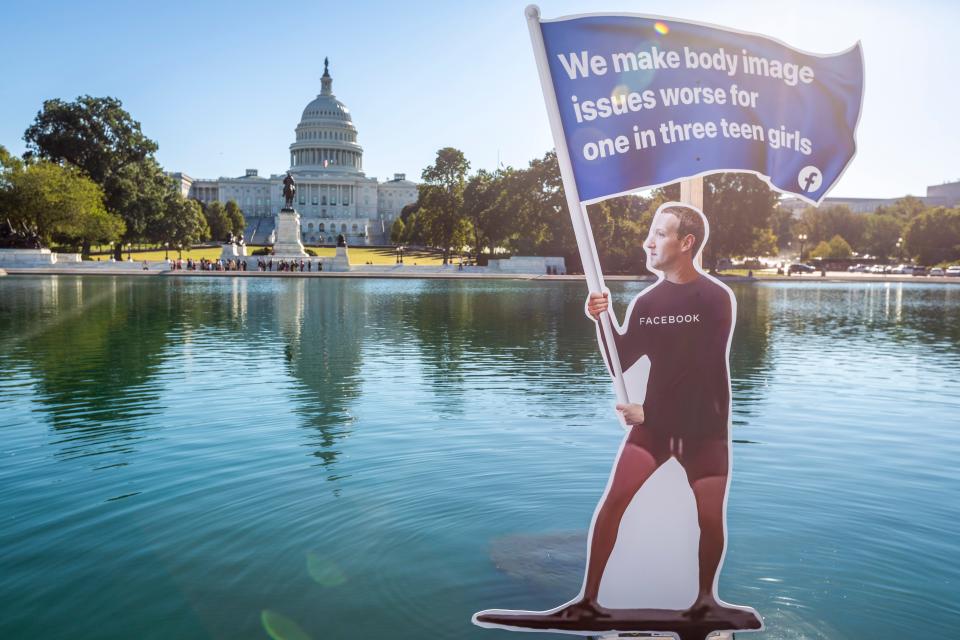Facebook whistleblower finally might force Congress to negotiate policing social media
- Oops!Something went wrong.Please try again later.
You’re reading Our View, one of two perspectives in Today’s Debate.
For Another View, by Facebook, read It’s long past time for Congress to set clear and fair rules.
It might be the world's longest learning curve, but it looks like Congress is finally coming to grips with the Facebook behemoth (and perhaps by extension, the many tech companies that touch American lives in myriad ways).
A savvy insider's whistleblowing testimony last week and her internal document dump finally shifted the tectonic plates of congressional dormancy over policing the social media giant and actually elicited focused, bipartisan rage.
Who knows? Maybe there will even be a law or two passed.
It's been a long time coming.
In the nearly two decades since Facebook's inception, it has provoked one controversy after another over the handling or mishandling of information scraped from now billions of users – from the Beacon scandal of 2007 to Cambridge Analytica in 2018.
Always there was the ritual: a grand summoning of founder and CEO Mark Zuckerberg to Capitol Hill (he has testified seven times), a little grandstanding by lawmakers who ask an ill-informed question or two, and then nothing. But this time, the meticulous rollout of revelations from former Facebook product manager and data scientist Frances Haugen in a Wall Street Journal series, a "60 Minutes" segment and in Senate testimony has had a different and galvanizing effect.
Armed with tens of thousands of pages of Facebook's own internal research, Haugen offered a peek under the friend-me firm's hood, and it wasn't pretty.
Facebook researchers learned that the company's Instagram social media network, with its heavy reliance on sharing personal imagery and lifestyle, was in many instances psychologically toxic to teen girls, causing a third to feel bad or worse about their bodies and a small percentage to even contemplate suicide.
'I feel bad when I use Instagram'
"Facebook's own research about Instagram contains quotes from kids saying, 'I feel bad when I use Instagram, but I also feel like I can't stop,' " Haugen told senators.

In developing areas of the world where Facebook is rapidly expanding, internal safeguards are weakest. In those regions, the company has done little or nothing about internal alarms showing Facebook is used by autocratic governments in Myanmar and Ethiopia to promote ethnic violence, drug cartels to recruit and train hit men, and human traffickers to lure women.
The source for much of this toxicity, Haugen revealed, were newsfeed algorithms Facebook developed to encourage healthy interaction, but which in fact funneled to users the kind of provocative content that uses people to spend more time online. More engagement translated into more ads, which translated into more income for Facebook, whose stock value has forever been on the rise.
But, Haugen testified, "in some cases, this dangerous online talk has led to actual violence that harms and even kills people."
It's a shameful contrast to the parallel reality that social media platforms, when they aren't a nexus for hate speech, serve a positive role connecting families and friends, and fostering business relationships. It's balancing the good with the bad where Congress must navigate.
'Facebook should not get a free pass'
Republicans and Democrats alike had legislative solutions in hand last week – endorsed by Haugen – that coalesced in two areas meriting serious consideration:
►Reform internet platform liability protections. Section 230 of the Communications Decency Act passed in 1996 is a core safeguard for social media companies, largely barring lawsuits over content posted by third parties. But a crucial reform discussed last week and promoted by Haugen would be for Congress to lift liability protection, not for content but for algorithms shown to stoke hate speech and even violence.
"Facebook should not get a free pass on choices it makes to prioritize growth and virality and reactiveness over public safety," she told senators.
►Require social media companies to share internal data with neutral researchers. This might be tricky because any legislation must prescribe that the government gain no access to this data. The data would remain, for example, with Facebook. But a regulatory agency such as the Federal Trade Commission would ensure approved scholars have access to conduct research. A Stanford professor already has a draft of how such legislation might work. But until neutral data scientists can demonstrate what harm is caused by these platforms, effectively policing social media won't be possible.
These are ideas that can negotiate the line between retaining what's good about social media while working to excise what's bad.
This is a moment for true and valuable reform that members of Congress must not let slip from their grasp.
USA TODAY's editorial opinions are decided by its Editorial Board, separate from the news staff and the USA TODAY Network. Most editorials are coupled with an Opposing View, a unique USA TODAY feature.
To read more editorials, go to the Opinion front page or sign up for the daily Opinion email newsletter. To respond to this editorial, submit a comment to letters@usatoday.com.
This article originally appeared on USA TODAY: Facebook, social media need oversight. Congress, help protect public.

